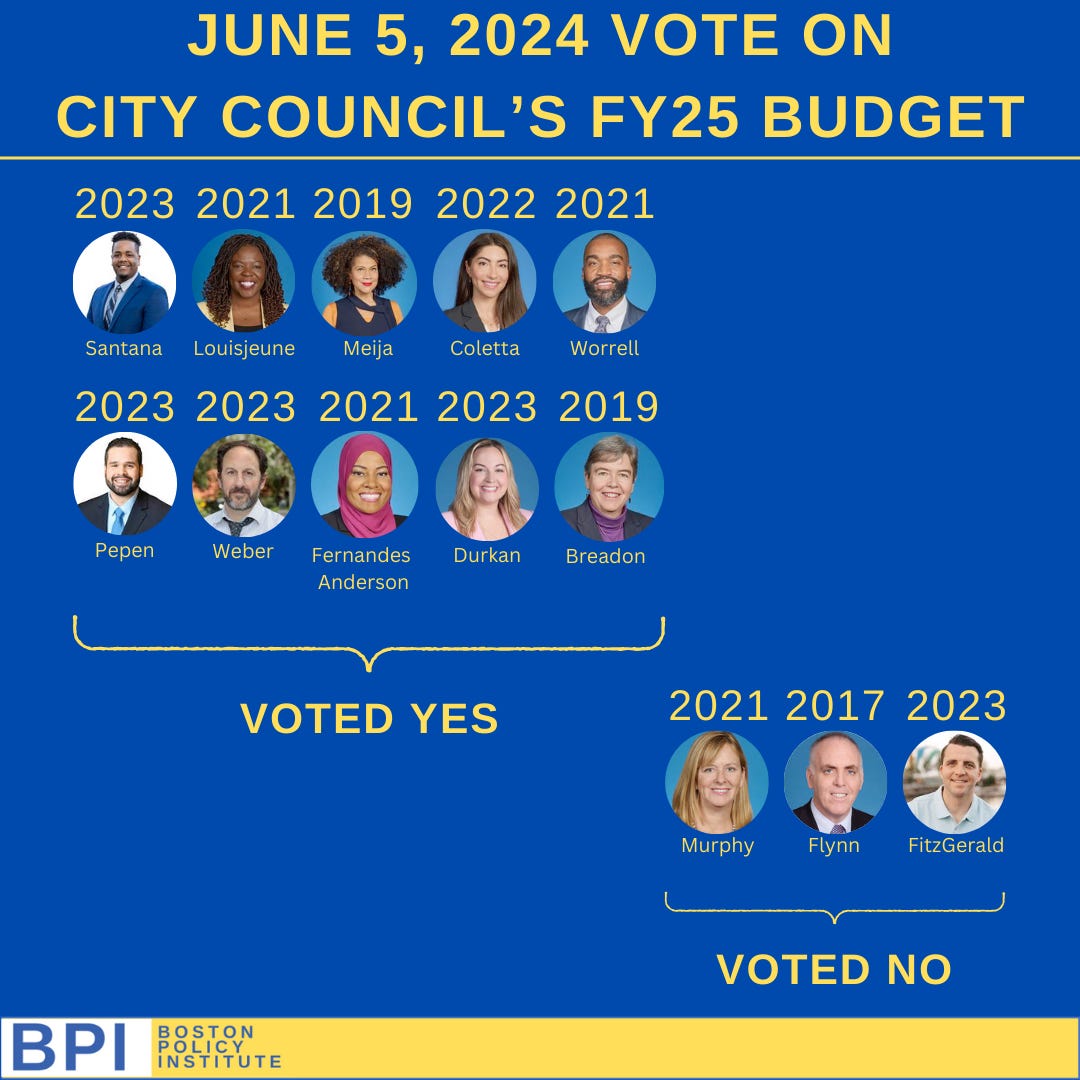INSTANT ANALYSIS OF MAYOR WU'S BUDGET VETO MESSAGE
A Mayoral veto, complicated vote-counting, and potential hostage-taking of BPS' budget by the Council raises the stakes of Wednesday's regular Council meeting
The agenda for Wednesday’s Council meeting has been filed and Mayor Wu’s letter lays out her position on the amended budget that the Boston City Council passed last week - find her letter starting on page 7 of the agenda packet. The Mayor’s decision to veto nearly all of the Council’s budget changes, plus the fact that Boston Public Schools’ operating and capital budget still have not been approved by the Council, turns Wednesday’s regular Council meeting into a high stakes event.
The Mayor’s letter adds significant detail to reporting from the Boston Herald on Sunday, June 9, that Mayor Wu said she was vetoing cuts to the budgets of Boston Police and Fire Departments. The Council made $15.3M in changes to Mayor Wu’s $4.6B budget, and the Mayor’s vetoes would reverse all but “approximately $2 million of proposed spending amendments,” according to her letter.
Now, the Council will have to respond to Mayor Wu’s vetoes. How the Council will respond is an open question, but in an interview with Ways & Means Chair Brian Worrell that was published in Politico Massachusetts Playbook last week, two of Chair Worrell’s responses seem to shed light on his thinking. BPI has already written about Chair Worrell’s “misinformation” accusation against his colleagues, but another exchange stands out:
The mayor has a lot of political allies on this council. Do you think there’s enough scrutiny of the mayor’s agenda by members?
We just amended the mayor’s budget by $15.3 million. And I think that just speaks to the council coming together, finding our shared goals and then stepping into our collective strength.
As BPI has noted, in order for Mayor Wu’s vetoes to be sustained, all three of the Councilors who voted no on the budget last week need to stick with their vote, and two Councilors who voted yes on the budget need to switch their votes.

The “a lot of political allies” line in Politico’s question may refer to the fact that three of the Councilors who voted yes on last week’s budget were elected in 2023 with Mayor Wu’s endorsement and worked for Mayor Wu immediately prior to becoming City Councilors:
District 8 City Councilor Sharon Durkan was Mayor Wu’s campaign fundraising consultant and the fundraiser for Mayor Wu’s inaugural committee before running for City Council;
At-Large City Councilor Henry Santana was the Wu administration’s inaugural Executive Director of the Office of Civic Organizing before running for City Council; and
District 5 City Councilor Enrique Pepen was the Wu administration’s first Executive Director of the Office of Neighborhood Services before running for City Council.
While the parliamentary maneuvering would be difficult on its own, there is an additional factor that increases the stakes and complexity: the Council has not passed the Boston Public Schools’ operating or capital budget. Mayor Wu notes the Council’s lack of action in the second-to-last line of her letter:
Our team looks forward to the continued partnership of the City Council in this operating budget process including the final approval of the Boston Public Schools appropriation and the FY25-FY29 Capital Plan.
Chair Worrell has also talked about this issue in public, writing about the possibility of not approving BPS budget in a public letter he posted May 18 on Instagram:
At our working session last week, councilors discussed the hypothetical process if the Boston Public Schools budget was rejected by the City Council.
Less than a week later two other Councilors talked publicly about not passing BPS budget during the budget hearing on BPS’ Long-Term Facilities Plan on May 23rd - read more about that in BPI’s Weekly Transcript Round-up from that week:
District 7 Councilor Tania Fernandes Anderson first raised the idea during her first rounds of questions - she is Speaker 9 and brings up not approving the budget at the 57:55 mark in the transcript; and
Councilor Meija brought the issue up as well - she is Speaker 7 and her comment about the budget starts the the 1:37:13 mark in the transcript.
In response to Councilor Fernandes Anderson’s question Superintendent Skipper gave a long answer and then handed it over to BPS CFO Bloom, who ended his answer about going to a month-to-month budget with this:
I'm not saying this would be a crisis necessarily by any means. It's something we could definitely manage, but it would lead to real consequences across all of our schools if if we weren't to know this is our appropriation for the year, if we were taking it month by month.
Read CFO Bloom’s whole answer in the transcript - he is Speaker 6 and his answer starts at the 1:08:35 mark.
With difficult math on a veto override and the open threat to not pass the Boston Public Schools operating and capital budget, Wednesday’s regular Council meeting promises to make significant amounts of news.
Boston Policy Institute, Inc is working to improve the public conversation - help us by following BPI on YouTube, TikTok, Facebook, Instagram, Threads, Twitter, and LinkedIn.




